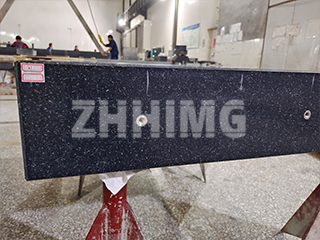Granite has long been recognized as one of the most stable and durable natural materials for precision measurement tools. However, when it comes to industrial applications, many people often wonder: what is the difference between ordinary granite slabs and specialized granite test platforms?
Both are made from high-quality “Jinan Blue” granite, a stone known for its exceptional density, hardness, and long-term stability. Through repeated machining and hand-finished precision grinding, these materials achieve high accuracy and excellent resistance to corrosion. Unlike cast iron platforms, granite never rusts, is not affected by acids or alkalis, and does not deform during transportation. This alone makes granite test platforms superior in many aspects.
The main distinction lies in purpose and precision. Granite slabs are primarily raw stone plates, valued for their rigidity, uniform microstructure, and natural resistance to stress and deformation. They provide the physical foundation for stability, with impressive properties such as high compressive strength, low linear expansion, and excellent wear resistance. These characteristics make granite slabs reliable for heavy-duty industrial use and long-term service life.
Granite test platforms, on the other hand, are manufactured according to strict national and international standards, with precision grades ranging from 000 to 0. Each surface plate undergoes fine grinding, calibration, and inspection to ensure ultra-flatness and long-lasting measurement accuracy. For example, the granite test platforms produced by professional manufacturers such as ZHHIMG Factory consistently achieve grade 00 precision, making them ideal for use in laboratories, quality inspection departments, and precision machining industries.
Another key advantage of granite test platforms is their easy maintenance. Their working surfaces remain smooth and burr-free without the need for oiling, minimizing dust accumulation and extending service life. Unlike metal platforms, granite is non-magnetic and electrically insulating, which further prevents interference during measurement. Even small scratches on the surface do not compromise accuracy, ensuring stable and repeatable testing results.
In practice, this means that while granite slabs provide the strong, stable base material, granite test platforms represent the precision-engineered application of that material. The combination of natural stone properties and advanced machining makes them an indispensable tool in modern manufacturing and metrology.
From machine tool workshops to research laboratories, granite test platforms continue to be the benchmark for precision measurement, ensuring higher product quality, superior processing accuracy, and long-term reliability.
Post time: Sep-18-2025

